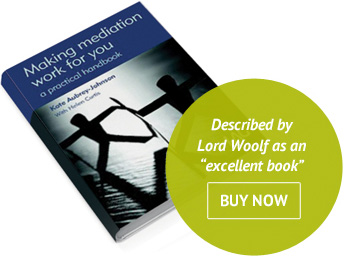Who makes the first move to mediate?
Either side can suggest to mediate, often setting out the benefits of mediation. If a party is not responding to the suggestion, we can make contact in a neutral capacity to gauge whether they are in fact willing to mediate.
How do you decide whether to mediate?
Either you or the Court or the other side may suggest mediation. Once the suggestion to mediate is made, a decision is required whether to mediate or not. There are lots of factors which influence each party’s decision whether to mediate; time, money, cost, perceived likelihood of settlement, desire to find a solution. If you would like to talk through your decision whether to mediate, get in touch with us.
One important issue is the financial consequence of refusing to mediate as a court may subsequently find your refusal to be unreasonable. Ignoring the proposal to mediate means that even if you win at court you may not recover all your legal costs.
Where can mediation take place?
Mediation can take place in person or remotely. A mix of remote and in person can be done when a party is overseas or unable to travel.
Remote Mediation: Starting in advance with a technical check and pre-mediation conversation with the mediator in the days prior to mediation. This time is used for introductions and offers parties a chance to ask any questions they may have about the process. Mediating online allows parties to be comfortable in a familiar environment with the reassurance that they can still communicate with their lawyers or those on their team, in confidence using breakout rooms.
In Person Mediation: Neutral venues are best so that parties can meet on an equal footing. Garden Court Mediation is housed within Garden Court Chambers offices in Central London and the conference rooms are used for in person conferences at no extra cost. Our reception team will assist with any refreshments needs on the day and make sure everyone is comfortable. If a mediation happens in person at another venue at the request of parties the costs would be split between parties.
On site mediation: On the occasion that parties feel a mediator would benefit from seeing the location of a dispute (EG neighbour/border disputes) a site visit can be arranged. If the location offers suitable space with separate rooms for each party then mediation can take place on site. Our mediator will always be joined by a colleague on these occasions. Travel expenses for both would be added along with any expenses incurred for rooms and refreshments.
Who should be at the mediation?
The people who need to make the decisions should attend the mediation and can be accompanied by those people who are advising them, whether business colleagues, lawyers or a friend or family member.
When is the best time to mediate?
There are different opinions. Some say soon isn’t soon enough, others say wait until the issues are clear. There is no universally accepted ‘best time’. If one party believes that settlement is possible and the other party is willing to try, then that may be the ‘best time’. Equally either party may request further information before agreeing to mediate.
What are the advantages of mediation?
It has the potential to save time, money, stress as well as reach certainty and finality about a dispute sooner rather than later.
What are the disadvantages of mediation?
Information may be revealed that a party would prefer to keep for court.
Who persuades the other side to mediate?
The Court can order a stay to provide time for the parties to mediate or one party can seek to persuade the other to mediate. In some circumstances, including before court proceedings have started, we can liaise between the parties to see whether there is a genuine willingness to mediate.
How to prepare your position statement
Preparing for a mediation contains some suggestions for what to include in your position statement.
What is our Code of Conduct
Garden Court Mediation is bound by the EU Code of Conduct for Mediators
What happens if you reach agreement?
The lawyers or individuals will draft the detail of the agreement which is likely to include reference to the agreement being in ‘full and final settlement’ of the dispute. Once signed this becomes a legally enforceable document and brings legal proceedings to an end.
What happens if there is no agreement on the day?
Depending on how far the parties have been able to narrow the issues during the mediation, the mediator may offer to remain in contact after the day of the mediation to see whether settlement can be reached.
For more detail, please contact us directly at mediationclerks@gclaw.co.uk or telephone 0207 993 7600 and we will be happy to help.
For Family Mediation, please see the separate tab.

